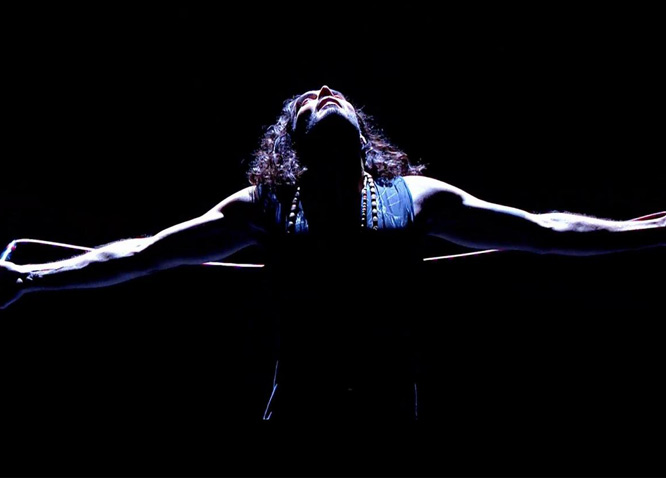 It is only fitting that actor, comedian, and author Russell Brand has ramped up his activist side in the past several years, as few other recent figures in pop culture have tested the powers of public perception quite as strongly. Once a Dickensian stage caricature whose act was telegraphed as such, he’s exploded into fame, burned out on it, and since retreated into visions of inner peace and social justice. He’s kept and even grown a massive following on social media, and one of those members is Ondi Timoner, director of “Dig” and “We Live in Public," and perhaps the perfect person to track Brand’s ambitions, contradictions, and self-described martyrdom.
It is only fitting that actor, comedian, and author Russell Brand has ramped up his activist side in the past several years, as few other recent figures in pop culture have tested the powers of public perception quite as strongly. Once a Dickensian stage caricature whose act was telegraphed as such, he’s exploded into fame, burned out on it, and since retreated into visions of inner peace and social justice. He’s kept and even grown a massive following on social media, and one of those members is Ondi Timoner, director of “Dig” and “We Live in Public," and perhaps the perfect person to track Brand’s ambitions, contradictions, and self-described martyrdom.
“Brand: A Second Coming” moves to both deconstruct Brand’s deific quality, while exploring the reasons why he’s essential to the media landscape. Filmed as Brand writes and performs his comedy special, “Messiah Complex,” worldwide, as well as publishing and promoting his call to arms, “Revolution," Timoner’s fascination with her subject extends to all sides of his personality and image. There’s the Essex-born comedy lover who opted for London and drama school; the stand-up and talk show host who kicked drugs but found sex instead; the headliner who dated a pop star, disappeared, and re-emerged as a political spokesperson.
These are paths that rarely lend to a clean narrative, but Timoner finds her sweet spot here in layering them, and exploring how Brand’s detractors use one to negate another. That public criticism is made all the easier by how Brand gleefully tests the boundaries of his material. An early clip shows him performing “Messiah Complex” in a packed auditorium, launching into a bit about the Bible’s weightier punishment toward homosexuality than coveting a neighbors’ livestock. He acts out each punishment towards homosexuality, growing more and more explicit, crude, and actually less funny. But Timoner cuts to her interview with Brand afterwards, where he marks that bit as a provocation to his liberal audience who think they can’t be shocked.
Aware though he may be of his act’s impact, it is still his act, and if your preferences stray away from that you’re likely to remain in that camp after viewing the film. But if his personality off-stage also appears manufactured or finely calculated, stay onboard. Timoner constantly questions those limits — can a self-described narcissist turn his performance “off” when being filmed? What is the cut off between spiritual oneness and selfishness when you’re a massive celebrity?
Interviews with family, friends, and prominent figures in film, music, and politics elaborate on those questions when it comes to Brand. David Lynch gives Brand a tour of transcendental meditation via posterboard presentation, Noel Gallagher provides blunt comic relief as he cuts down any signs of weakness in Brand’s life, and former writing and podcast partner Matt Morgan provides observations on Brand’s past and working process.
READ MORE: The Best Films Of The 2015 SXSW Film Festival
Timoner swirls this concoction of travelogue, interviews, and archival footage into a fast-paced, often hilarious, knowingly indulgent piece, and one that entertains the craziest political and comedic ideas while dissecting the ones already fixed. It only starts to wane in the film’s final third, as Brand enters the political realm as a supporter of drug and sex rehabilitation programs, the Occupy movement, and others. While featuring some tellingly brilliant moments (Timoner shows Brand’s U.N. speech on drug addiction as equal parts autograph signing and issue-related debate), Brand’s whirlwind personality starts to exhaust as the film reaches its 124-minute runtime.
For its majority, the film is all comedic and political fire, but as its winds down, Timoner rounds it off with a tone of melancholic, tragic inevitability to Brand’s life. As one interviewee mentions, it’s a tale that can’t end well due to his all-in nature and impulses, and as Brand enters more and more into political activism, the weight of the world might just crush him completely. Brand bowed out of the SXSW premiere as he found the film “oddly intrusive and melancholy,” and felt the doc was a cradle-to-grave story when the grave hadn’t come. A fascinating slice of the film comes when Timoner and Brand share a conversation in a car ride, and they debate exactly how subject and documentarian see one other. One side may not agree with the finished vision, but it’s a fascinating angle on a multi-faceted individual. [A-]
This is a reprint of our review from the 2015 SXSW Film Festival.





